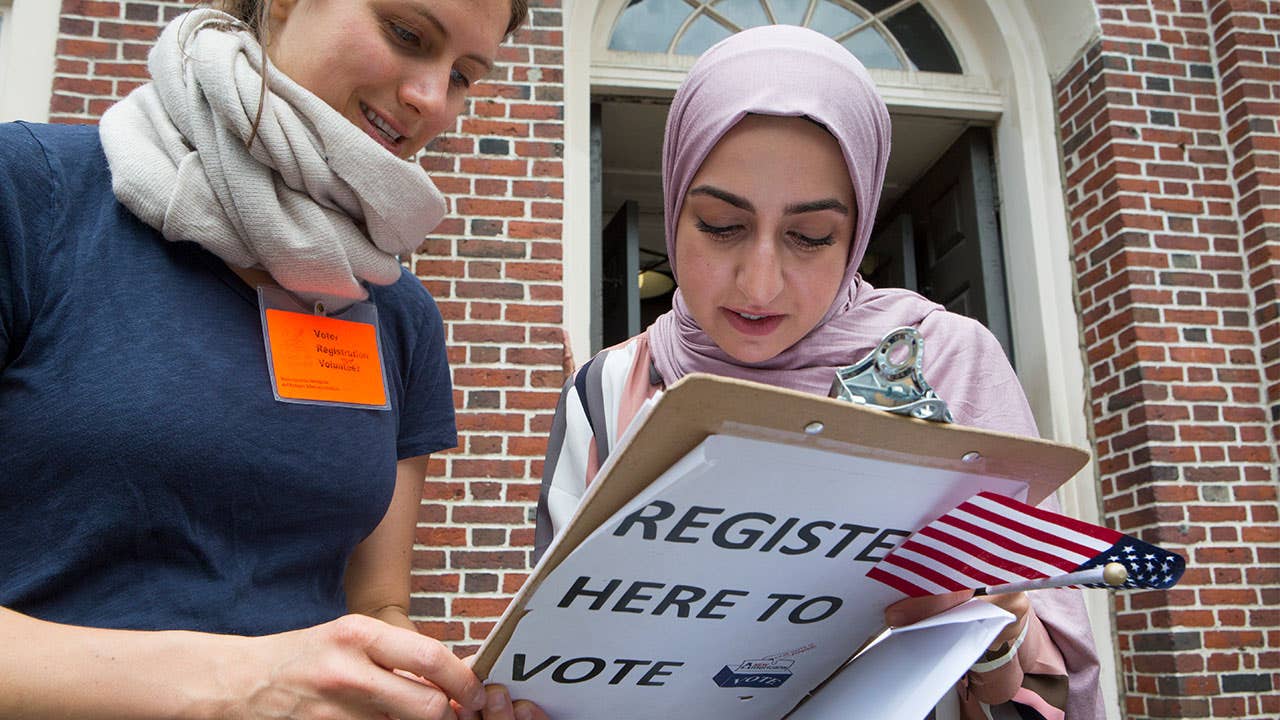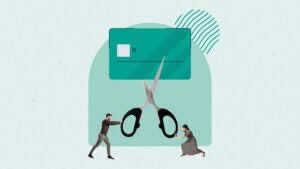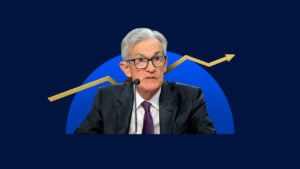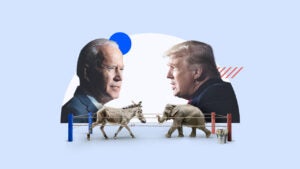Most important issue for voters in 2020 is the economy, Bankrate survey reveals


The economy will likely be on the minds of most Americans as they choose a president in 2020, a new Bankrate survey found.
The nation’s financial well-being was cited as the top issue driving how people would vote in the upcoming presidential election by nearly one-third of respondents, according to the Bankrate survey results released today.
Americans were almost evenly split on whether President Donald Trump or the Democratic 2020 frontrunner Joe Biden would be better suited to take on the economy, the results show.
Key takeaways:
- Thirty percent of Americans say the economy is the most important issue when determining how they’ll vote for president in 2020. Other key considerations include immigration (19 percent), health care (18 percent) and national security (18 percent).
- A slim majority of respondents believe Biden (46 percent) would do a better job handling the economy than Trump (44 percent). It was essentially a toss-up for the two politicians when factoring in the survey’s 3 percent margin of error. Biden was more favored to handle other key issues, especially health care and immigration.
- Respondents 55 and older were more likely to say health care was the most important issue when choosing a president in 2020. And they tended to think Biden would do a better job of handling the issue compared with President Trump.
- Women said Biden would better handle key political issues, including the economy (54 percent), health care (63 percent), national security (58 percent), immigration (57 percent) and issues that affect your personal financial situation (56 percent). Men generally favored Trump to handle those issues.
Political concerns vary by age
Millennials (ages 23 to 38) and Generation X (ages 39 to 54) were most likely to list the economy as the most important issue when deciding how to vote in 2020. They did so 37 percent and 34 percent of the time, respectively, according to the survey.
Respondents past their prime working years were less likely to cite the economy as their top political concern. Twenty-eight percent of those in the silent generation (74 and older) and 27 percent of baby boomers (ages 55 to 73) listed health care as their chief political issue.
Adults 55 and older account for more than half of total health spending in the U.S., according to the Peterson-Kaiser Health System Tracker.
Biden vs. Trump
We’re still about a year away from the party nominating conventions. At this point, Biden is generally considered the Democratic frontrunner in the race to face off against Trump.
Most people, regardless of who they would vote for, say Biden would do a better job than Trump handling the economy, health care, national security, immigration and issues that affect your personal finance, according to the Bankrate survey.
Biden served as President Barack Obama’s running mate at a time when the economy was recovering from the most significant downturn since the Great Depression. That legacy helps him stand out from other Democratic contenders, says Rachel Bitecofer, a political science professor and assistant director of the Wason Center for Public Policy at Christopher Newport University.
“He can run on going back to a happier time and that’s the Obama time. That’s very positive. Right now, the electorate is very uncomfortable. People want to go back where they can just watch Monday night football and not be nervous all the time,” Bitecofer says.
Biden had the largest advantage over Trump on health care, the survey results show. Fifty-five percent of respondents said the former vice president and senator from Delaware would do a better job addressing health care, compared with 34 percent who favored the president.
Respondents were more divided about who would better to maintain the current economic expansion. Forty-four percent said Trump would better handle the economy — his highest percentage for the five issues, the results show.
But slightly more (46 percent) respondents said Biden would do a better job handling the economy. This was within the margin of error for our national survey and it was Biden’s smallest lead out of the five issues Bankrate asked about.
“Traditionally speaking, economic performance has been a really powerful indicator of how the incumbent or incumbent party fares in the presidential election,” Bitecofer says. But her research shows Trump might not be able to benefit fully from the strong unemployment rate and other positive economic factors because the electorate is much more polarized than in past years.
Independents who would be responsive to the strength of the economy under Trump might not be as wooed over by it the way they would maybe 20 years ago because of negative or intense debates about immigration, health care and other issues, she says.
Key differences between women and men
The economy was the most important issue for men (32 percent) and women (27 percent) when determining who should get their vote in 2020, the survey results show.
However, there was a major gap between the sexes about whether Biden or Trump would do a better job handling the issue.
Most women favored Biden (54 percent) over Trump (37 percent) to handle the nation’s financial well-being. Men were on a different page — 51 percent said Trump would do a better job and 38 percent opted for Biden.
A similar pattern emerged when Bankrate asked about national security, immigration and issues that affect your personal finances. Women said Biden would do a better job handling the issue. Men favored Trump. The same disparity trend surfaced between white individuals (more indicated Trump would do a better job) and minorities (more opted for Biden).
Health care was an exception. Twenty-four percent of women said it was the most important issue — the second-highest behind the economy. Only 12 percent of men agreed. But both sexes, as well as whites and minorities, said Biden would do a better job handling the issue.
“The base alone won’t be enough to propel Trump back into a second term if the Democrats have a high turnout, particularly among suburban women who may well decide the next election,” says Mark Hamrick, senior economic analyst at Bankrate.
Working on your own economic game plan
The U.S. has been in an economic expansion for more than a decade. Adults earlier in their careers or reaching their peak earning potential want to see the momentum continue.
Earlier this month, Federal Reserve Chairman Jerome Powell said, “it’s very important that this expansion continue as long as possible.” Sustaining a low unemployment rate and strong business growth could help bump wages, which have lagged since the Great Recession.
Political headlines come and go, but it’s imperative for individuals to identify their financial goals try to stick to their game plan, says Hamrick. “While it’s important to be engaged politically and to make voting decisions that help one’s own financial situation, it’s also important to run that playbook with respect to one’s personal finances which includes saving for retirement, saving for emergencies and paying down and paying off debt.”
“The silent generation and older are most often on a fixed-income, and one of the things that can really throw a monkey wrench into their personal finances is the lack of access and affordability of health care,” Hamrick says. Older Americans are likely watching the legal fight about the Affordable Care Act and paying attention to what candidates are proposing to improve the current health care system.
Methodology
The survey was conducted for Bankrate via telephone by SSRS on its Omnibus survey platform. Interviews were conducted from July 1-7 among a sample of 1,025 respondents — 989 in English and 36 in Spanish. The margin of error for total respondents is +/-3.34 percent at the 95 percent confidence level. All SSRS Omnibus data are weighted to represent the target population.
Why we ask for feedback Your feedback helps us improve our content and services. It takes less than a minute to complete.
Your responses are anonymous and will only be used for improving our website.




